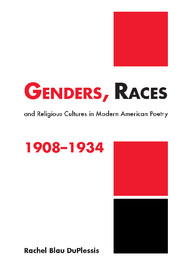Book contents
- Frontmatter
- Contents
- Acknowledgments
- 1 Entitled new: a social philology of modern American poetry
- 2 “Corpses of poesy”: modern poets consider some gender ideologies of lyric
- 3 “Seismic orgasm”: sexual intercourse, its modern representations and politics
- 4 “HOO, HOO, HOO”: some episodes in the construction of modern male whiteness
- 5 “Darken your speech”: racialized cultural work in black and white poets
- 6 “Wondering Jews”: melting-pots and mongrel thoughts
- Notes
- Works Cited
- Index
6 - “Wondering Jews”: melting-pots and mongrel thoughts
Published online by Cambridge University Press: 05 October 2009
- Frontmatter
- Contents
- Acknowledgments
- 1 Entitled new: a social philology of modern American poetry
- 2 “Corpses of poesy”: modern poets consider some gender ideologies of lyric
- 3 “Seismic orgasm”: sexual intercourse, its modern representations and politics
- 4 “HOO, HOO, HOO”: some episodes in the construction of modern male whiteness
- 5 “Darken your speech”: racialized cultural work in black and white poets
- 6 “Wondering Jews”: melting-pots and mongrel thoughts
- Notes
- Works Cited
- Index
Summary
If the anti-Semite charges that the Semitic spirit mongrelizes his national culture, the Modern Pharisee complains that the mongrelization is quite mutual … In fact, Jews being a minority people, they are more mongrelized than mongrelizing.
Joel Blau, Atlantic Monthly, 1922In 1883, two years after Russian terrorists assassinated Czar Alexander II, compelling (in the scapegoating and pogrom aftermath) a mass migration of Russian and Polish Jews to the U.S. and England, Emma Lazarus composed “The New Colossus.” This sonnet, now inscribed at the base of the Statue of Liberty, contrasts old world and new, the “brazen” Apollo at the harbor at Rhodes and the statue called “Mother of Exiles” (1883).
“Keep, ancient lands, your storied pomp!” cries she
With silent lips. “Give me your tired, your poor,
Your huddled masses yearning to breathe free,
The wretched refuse of your teeming shore.
Send these, the homeless, tempest-tost to me
I lift my lamp beside the golden door!”
(Lazarus 1947, 41)Lazarus took hold of many pseudo-scientific descriptors of the immigrants of the late nineteenth century: Jews, Slavs, Italians, Irish, in such flash-point words as “teeming,” suggesting overwhelming fertility, and the enormous euphony of “wretched refuse,” connoting disease, filth, and garbage. The word “masses,” perhaps evoking the political radicalism that could plot and undermine, was neutralized by the vulnerability of “huddled.”
- Type
- Chapter
- Information
- Publisher: Cambridge University PressPrint publication year: 2001



